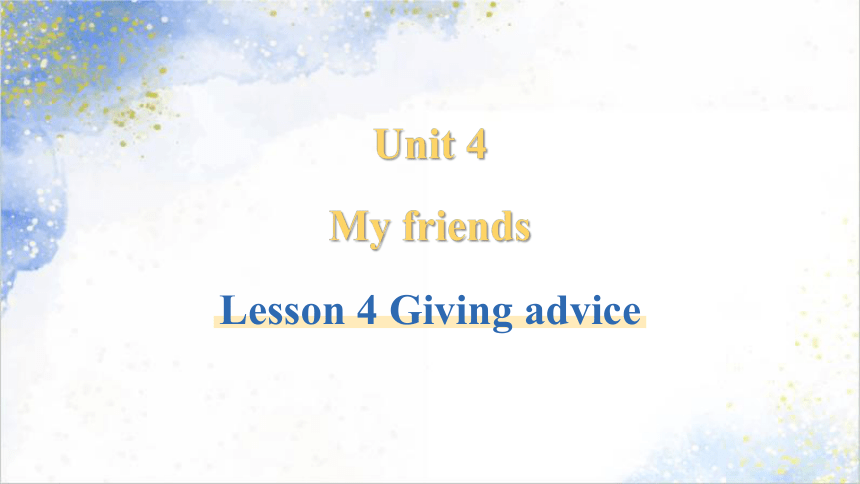(
课件网) Unit 4 My friends Lesson 4 Giving advice 1. To master some new words and phrases. 2. To understand the post about the problem and advice. 3. To write a reply to give some advice. 学习目标 When you have a problem, you get advice from_____. A. parents B. teachers C. friends D. the internet A B C D 新课讲授 Lead in Sam: In primary school, I had many friends and we had a good time. But things changed. Now I am afraid of the new things in junior high school. I don’t get along well with my classmates. I don’t have any friends. This makes me sad. What should I do Bob: Don’t be sad. And don’t be shy. You are a new student, and other students are new, too. Everything will be okay. Claire: You need to work on yourself. I once experienced the same problem. I felt lonely. It was a hard time for me. I tried many ways to develop friendships. Smiling worked best. Emma: What is your hobby You can join some clubs in your school. I think that’s an easy way to make friends! David: I feel the same as you! Can you play ping-pong We can have fun after school. Reading Read the post and complete the mind map. Advice for Sam You need to work on yourself. Have fun playing ping-pong after school. Don’t be sad or shy. Join some clubs in your school. 1. But things changed. 但情况发生了变化。 change ①[动词] 变化;改变;交换 e.g. You might change your mind. 你也许会改变想法。 ②[名词] 变化;替代 e.g. There are great changes in my hometown in recent years. 我的家乡近来年发生了很大的变化。 Language points 2. I don’t get along well with my classmates. 我和我的同学相处得不好。 “get along (well) with 和……相处融洽”,相当于 get on(well)with;get along/on badly with和……相处得不好 e.g. The new teacher is getting along well with the students. 这位新老师和学生们相处得很好。 【拓展】 get along/on with sth.(谈及或问及工作情况等)进展 e.g. How are you getting along/on with your novel 你的小说写得怎么样了? 3. You need to work on yourself. 你需要专注于自身。 (1) “need [实义动词] 需要”,有人称和数的变化,后接名词、代词、动词不定式等作宾语。 e.g. I need your help. 我需要你的帮助。 拓展:“need [情态动词] 需要”,没有人称和数的变化,后接动词原形,常用于疑问句和否定句中。need开头的疑问句,肯定答语用must/have to;否定答语用needn’t或don’t/doesn’t have to。 e.g. —Need I come tomorrow ———我明天需要来吗? —Yes, you must/have to. ———是的,你必须来。 e.g. I’m trying to work on myself. 我在努力专注于自我。 (2) “work on oneself 专注于自身”,oneself 随主语的变化而变化。 4. I feel lonely. 我感到孤独。 e.g. My grandma lives in a lonely village. 我奶奶住在一个偏僻的村子里。 lonely①孤独的 e.g. She felt lonely when she first arrived here. 她初到这里时感到孤独。 ②偏僻的 【拓展】alone [形容词&副词]单独;独自 e.g. He was all alone in the world. 他在这世上孑然一身。 5. I tried many ways to develop friendships. 我尝试了很多方法来发展友谊。 develop [动词]发展;开发;研制 e.g. Sports can develop bodies and minds. 体育 ... ...

